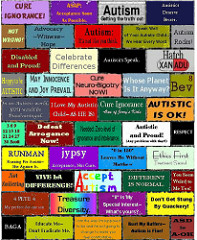Andrea discusses a variety of issues related to AD/HD:
Fidgeting is not something to be punished or “trained out”, as it provides a necessary stimulus that helps the ADHD person to focus: The Fine Art of Fidgeting.
AD/HD people pay attention in sometimes different ways than people expect, and it often doesn’t seem to others that we are. Attendance Required.
We’ve all managed to lose a Very Important Object in the Dreaded Safe Place. Quite likely something financially, socially, or professionally terrible will happen if we don’t remember the VIO and DSP soon. ::sigh:: There are Safe Places (such as safe deposit boxes at the bank, which are quite safe, especially when we put our key in a DSP), and there are Safe Places that are so safe we can’t find stuff ourselves. There are two necessary qualities for a good Safe Place: rational and inescapable. Losing Something in the Dreaded Safe Place.
Not all kinds of messes are the same; some are not only useful, but creatively necessary messes: The Taxonomy of Mess.
Housekeeping isn’t “hard” in the sense of physically mopping a floor, but hard in the sense of figuring out where to start, how to keep the momentum going, getting the job finished, and even figuring out what to do with stuff. The so-called “executive functions” of planning, execution, self-monitoring et cetera are not limited to office work — they are just as necessary in the realm of what used to be referred to (somewhat tongue-in-cheek) as “domestic engineering” … Maslow Cleans House.
Of course, there are a few people who “don’t believe in” AD/HD. And there are people who believe that it exists, but can’t quite get their brains wrapped around the whole How and Why of it. You know, What could possibly be so hard about something as straightforward as getting dressed, eating breakfast, and driving off to work? Well, it’s like this: How to Get Ready, in N Recursive Steps.
Students with various learning disabilities may have processing issues. We have to take information in, make sense of it, retrieve information, and then be able to relay information back. Various kinds of learning disabilities interfere with steps in this process, and the interference can happen at more than one step, especially when a person has more than one kind of difficulty. Let’s take the subject of, “Answering a question asked of you”. Most people assume that this is really simple, and thus, easy. Hah! How Hard Can It Be?
“Oh noes! There’s an epidemic of kids with AD/HD!” Not really. That such a large percentage of students are now requiring various accommodations does not mean that we have a greater number of “damaged” children. Rather, it means that we have more students who are actually getting diagnosed as not being able to learn the same way as most of their peers: All Those Needy, Needy Kids!
So how come four times as many boys have AD/HD than girls? Or are there just more boys than girls diagnosed? Where Are All of Us?
The Betweens are evidenced when the intense GoGoGo from having a new perseveration (or a new slant on a favorite old one) has worn off. Sometimes it’s the body and sometimes it’s the mind. Or maybe it’s both, and you feel about as useful as a beached jellyfish and as brainy as a slug. You can’t keep your train of thought on track. You can’t remember squat, which is frustrating as hell for a mind that’s used to going brilliantly full-tilt. The ennui is horrible, and like a junkie searching for old dribs and drabs of their favorite fix, you schlump from staring at the dregs of one old obsession to another, staring dumbly at piles of hobby materials or over-loaded bookshelves and not even sure why you have these things sitting around, or possibly even what you did with them. The Dreaded Betweens.
The coming-to-grips part after getting an ADD/ ADHD diagnosis is a longish, interesting journey, full of ups and downs. This is especialy true for adults finally getting a diagnosis. Gripping News.
The most difficult parts of self-advocacy are not, as many people suppose, the initial part of overcoming one’s inertia, and fear of venturing into the unknown. Any thoroughly-annoyed person can usually make that first step. Rather, the difficult parts are discovering what sorts of hidden (bureaucratic) hurdles are in your way, what sorts of prejudices people have, and how to deal with people’s emotional blocks to rational discussion. First Foray.
Everyone in life has to compensate in some manner or another, because no one excels at everything. In fact, the economy depends upon people’s interdependency — earning your living doing things for others is important to the Gross National Product, is important to a town’s sense of community, and is important to a person’s self-worth from feeling useful. The problem with over-compensation is that although I have at times felt that I had vanquished my personal demons of incompetancy by having overcome various failures with landmark achievements, those successes do not mean that I cannot or will not have future problems! Running With the Red Queen.








Carol Wolf said,
26 August 2013 at 17:03
Andrea I was searching for a speaker about APD and how it affects children and adults. I found your blog intriguing. I am an administrator at a school for students with learning differences. It is very small (60) students and this is our 25th anniversary. We would like a speaker, that does not charge a lot of money, speak to our families and families in the community helping them understand how difficult it is to have APD. but also strategies to help cope.
Do you ever speak at schools?
Clutter, Creativity, ADHD, Buzzing About . . . and Coping Strategies. | 3Di Associates – 3D Eye said,
1 July 2012 at 10:36
[…] https://qw88nb88.wordpress.com/add-adhd-coping-strategies-for-school-work-and-home/ […]
B Feenstra said,
15 December 2010 at 16:24
oh how I relate to all of this. If I don’t put the VIO in a DSP, I believe it is lost forever. However, I have learned not to sweat the finding of the VIO, as I know it will eventually turn up when I put another VIO in a DSP.
I have squirelled away my nuts, only to find I have forgotten or misplaced them. I swear that other squirrels in my house would move things just to see what I would do. My ex used to do this very thing and when I reacted or asked about it, he denied doing it and I found he had put a lot of my struff under a crawl space in the house while I was out of town.
I came home to find all of my sewing boxes and fabrics thrown in the crawl space – his explanation was we needed the space – ??? So others can contribute to losing objects and misplacing things to make you think you are crazy.
Now I have my own place and always seem to find my VIO unless of course I get distracted lookingf for the dreaded DSP.
GORDON HARAOD DOWTON said,
21 June 2010 at 11:14
Curious. Ever more CURIOUS. I was born a child of wonder…but do seriously wonder at all the diagnostic labels given to this fine carding of ‘it might be this or..the rabbit/duck perceptual puzzle’…I’ve slept for two weeks in Pere la chaise cemetary in Paris(cool, dark, quiet)while being a high end cabaret performer at night. I have invented in the biomedical field with buisiness ventures with two universities, donated a theoretical burn care means to a group in the U.S. and now grow moss gardens in my parents garden while on long-term disability. KUDOS to you and this site.
Dana Baez said,
25 September 2009 at 5:28
Hello,
I have appreciated this site more then you know. I think my daughter suffers from APD, and I am seeking some advise on how I can help her get her confidence in herself back. My heart aches for my little girls struggles. She is now 8 and we are going through some evaluations through our district. If you can please give me some personal advise I would greatly appreciate it.
Thank you very much
grace said,
10 July 2009 at 0:36
this is awesome. having been diagnosed with innattentive AD/HD (without hyperactivity), it’s very cool to actually find a blog on this stuff!
Efrique said,
23 April 2008 at 6:41
useful resource.